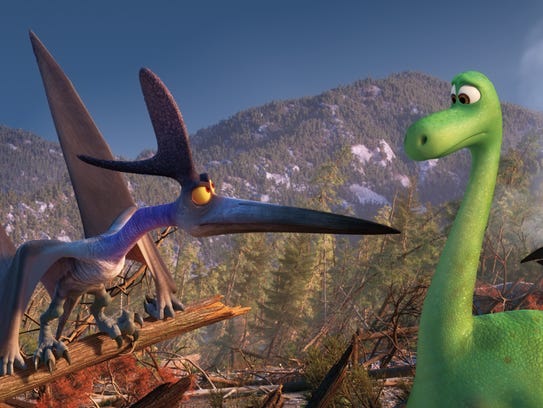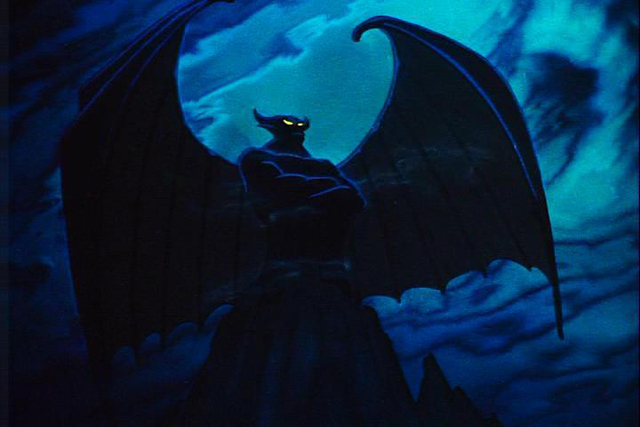Sweetness and Light, Maybe
 Last December I saw The Good Dinosaur in theater. In one moment I will never forget, a pterodactyl rescued a “critter” trapped beneath a log by a fierce storm. Now, you cannot appreciate the full impact of this moment until you appreciate that this critter was a baby fox, as adorable as only a Disney sense of animal cuteness and a Pixar skill in animation could make it. After pulling this little fox out of the wreckage of the storm, the pterodactyl – this is the unforgettable part – ate him. The audience’s eyes bulged, cartoon-like, at the shock of instant furry death. Pixar, I didn’t know you had it in you!
Last December I saw The Good Dinosaur in theater. In one moment I will never forget, a pterodactyl rescued a “critter” trapped beneath a log by a fierce storm. Now, you cannot appreciate the full impact of this moment until you appreciate that this critter was a baby fox, as adorable as only a Disney sense of animal cuteness and a Pixar skill in animation could make it. After pulling this little fox out of the wreckage of the storm, the pterodactyl – this is the unforgettable part – ate him. The audience’s eyes bulged, cartoon-like, at the shock of instant furry death. Pixar, I didn’t know you had it in you!
But maybe I should have guessed. Pixar is, after all, part of Disney, and Disney’s reputation for sweetness and light has long been exaggerated. Despite its towering reputation for almost saccharine goodness – or, more likely, because of it – Disney routinely gets away with things that would leave lesser movie studios branded. For The Hunchback of Notre Dame, someone might have even gone to jail.
Let’s begin at the beginning. Remember the moment in Snow White when the Evil Queen cackles about Snow White being buried alive, or jeers at the skeleton of a prisoner who evidently died reaching for a jug of water? “Thirsty? Have a drink!”
Then there is Dumbo, the movie about the baby elephant whose life is a progressive mounting of humiliation. He is mocked first by other elephants, who wouldn’t let him play in any … No, wait, that’s a different story. Dumbo was mocked by his fellow elephants, then by human beings; his mother, the only person who loved him, was taken away and chained up; then he was repeatedly used by clowns, whom children ought to love but don’t, in a humiliating skit. The artistic masterpiece of the film is Pink Elephants on Parade, a song about the hallucinations Dumbo and his mouse friend experience after accidentally imbibing alcohol.
If not for Dumbo, The Fox and the Hound might well be the most bathetic of the Disney animal films. It is surely the most bittersweet. Although thin fare in some ways, and almost silly in its climactic danger, The Fox and the Hound is ruled by the thought that there are limits that cannot be broken and friendships that cannot be made. This is a juxtaposition that has long impressed me: the unusually childish climax, the unusually grown-up theme.
The original Fantasia features an evolution sequence that consists primarily of  dinosaurs eating each other, or attempting to, before fading away in a torturous, water-starved trek. If your child has failed to realize the essential cruelty of the survival of the fittest, Disney can correct that. At least half of the final act of Fantasia is devoted to a devil-figure that summons dancing ghosts and skeletons. I would have thought that this, the most macabre imagery in any animated Disney film, would have achieved a little fame, but it hasn’t. Not enough people noticed. (Perhaps they were turning off the movie at the dancing hippos.)
dinosaurs eating each other, or attempting to, before fading away in a torturous, water-starved trek. If your child has failed to realize the essential cruelty of the survival of the fittest, Disney can correct that. At least half of the final act of Fantasia is devoted to a devil-figure that summons dancing ghosts and skeletons. I would have thought that this, the most macabre imagery in any animated Disney film, would have achieved a little fame, but it hasn’t. Not enough people noticed. (Perhaps they were turning off the movie at the dancing hippos.)
I haven’t gotten into The Hunchback of Notre Dame, and I don’t really want to. To give you, briefly, an idea of the sweetness and light that is this movie, I offer the following observation: The song-and-dance number the Gypsies do about executing prisoners because “the dead don’t talk” is a bit grim, but it’s a barrel of laughs compared to “Hellfire”.
Disney has gone some dark places. Why, then, their reputation? It might be that people don’t watch much classic Disney, or haven’t since childhood, and go more by old memories and cultural impressions than firsthand knowledge. It might be that people’s expectations are so strong they are slow to notice when Disney diverges from them. It might be that some people believe, consciously or not, that until a story uses bad language, or is explicitly sexual or violent, it never reaches the darkness.
Another reason is, of course, that Disney films are usually lighter than their original tales, and lighter than many modern stories. But there are very few stories that do not, on examination, at least touch the darkness. In our world, that’s what stories are made of.









































I loved that you said that. Especially with Dumbo when you watch it with new eyes. Pinocchio, Finding Nemo, and Notre Dame had all kind of darkness and sensuality in it, Hellfire will always be one of my favorite songs. Scar’s ambitions to kill his brother, Inside Out, Toy Story (the first one) Buzz Lightyear’s discovery of the real world. A lot of them are dark but well narrated that people miss it.
May I direct your attention to the slaughter of the Imperial Army in Mulan? The gruesome end of Clayton in Tarzan? Ratigan going berserk, not to mention the pub scene in The Great Mouse Detective? Cuella De Vil on principal? (She wants to kill and wear puppies!) The *Judas Priest* incinerator scene in Toy Story 3?! The Gargoyles TV show? (“I’ve been cheated of everything…. even my revenge!!!”) I love Disney, but the idea that they are all happy bunnies and rainbows is ludicrous on it’s face. You still need discernment, even with animated movies. I won’t be letting my hypothetical kids see some Disney movies until they are old enough to understand what’s going on.
Good article.
I’ve noticed many “children’s” shows, inside and outside Disney, tend to seem light and fluffy, until you stop to think about them. Some even go deeper than shows for adults. In the Green Lantern Animated TV series, the show went deep into showing that love is sacrifice. Mosts “adult” shows I’ve seen never bring this up, especially outside the Christian genre. (In many of them, it seems love is lust.)
Another thing I’ve seen in “children’s” shows is that if someone makes the life changing decision to leave a bad group, they often do it for reasons other than falling in love with the enemy. The shows I like often give both sides of the story during military conflicts, showing there are shades of gray in a war, an important lesson.
A lot of animated TV shows and movies get judged a bit harshly for being “for kids.” The Star Wars TV shows end up having torture in them. The Clone Wars had one of the highest named character body counts I’ve seen. Some of them died in awful incidents, like friendly fire or other tragic incidents. The Clone Wars also never shied away from having the good guys kill people. I even spotted some of the (good) soldiers gunning down injured enemies, and those enemies weren’t robots. Star Wars Rebels tends to be a little lighter and softer than The Clone Wars(which wasn’t made by Disney), but still has beheadings(sort of off screen) and torture.
If these shows were live action films and had blood, the grittier episodes would probably be considered gritty PG-13.
You might be interested in my post on some of the lessons these “children’s” shows can teach. https://jessilroberts.wordpress.com/2015/06/28/childrens-shows-just-as-deep-as-adult-shows/
Preach! People don’t give “kid’s shows” enough credit.
I’m hoping that, as the next generation grows up, the stigma of animated shows being for children will die down and more adults will be willing to watch these good shows. What I like about them, is though they have depth, they tend to be cleaner. (I get pretty tired of the sex in the adult shows.)
Don’t get me started on the sex business. I like my romances innocent, thanks very much. But a lot of kids shows are so well written! I liked Green Lantern for that most recently. (I feel kinda weird about Razer and Aya, because she’s a robot, but I like their personalities together. Kind of like Martin the Warrior and Rose in the Redwall books)
Oftentimes I find Christians on this subject stop short before watching the whole thing or saying the whole story. The Hunchback of Notre Dame may not be one of Disney’s best, but you should tell the whole story of it. Yes, it has darkness. It also has light and love. In the end, the evil one is dealt wth in a rather unforgettable manner, and that is directly attributed to no one less than God Himself. God judges, destroys and punishes the wicked one in a graphic and very biblical way Good wins. Quasimodo learns what love is. Without the darkness to frame it, this beautiful and God-honoring end loses its power. As far as Fantasia goes, I saw people get up and leave the theater. Not at the great “black god” Chernobog rising out of the mountain, but at his defeat with the sunrise and the moving sweetness of the closing piece, Ave Maria. Again, God is glorified. God’s Llight triumphs over the darkness. We need both to see the whole picture. The Light shines, yes — but in the darkness as John tells us. Both show what God means for us to see, not just the Light.
That’s quite true! My brother and I loved Fantasia, but Chernebog always scared me and we would fast forward through that section and head to Ave Maria. Same with Hunchback. Hellfire was skipped, but the lessons of looking past the appearance and love are kept. Oddly, the lead animator of Chernebog, Kay Neilsen is one of my favorite fairy tale illustrators.
I want to see The Good Dinosaur, hopefully I can soon.
I wonder if part of Disney’s reputation is partly because of some views it seems to show, or because its seemingly more innocent shows were popular at a certain time. In Cinderella, the main character is rewarded for her goodness. She not only achieves her dreams, her dreams make her happy. Classic case of the idea of ‘Follow your heart and you will always end up doing the right thing.’. This seems fluffy and innocent because in real life it is generally not a good idea to marry someone one just met. In real life, the prince could have easily been a bad person, or Cinderella could have found out that life as a princess was not what she wanted after all. In Mulan, her whole idea is ‘follow your heart and you will do the right thing’. In the second film, she was so opposed to arranged marriage that she put a whole nation in danger, and I don’t know if she specifically addressed a solution to the fact that they still needed the alliance to defeat their enemies. That shows a sweet and fluffy view of things. It basically says ‘if I follow my heart and work for my desires, there’s no way I can doom those around me. So I don’t need to think through the consequences of following my heart.’
I thought your assessment of Fox and the Hound was interesting. I watched it a lot growing up, didn’t see it as particularly dark compared to everything else, and saw it as friendship and goodness winning out in the end. Copper was blinded by vengeance and went after Todd, but Todd still went back and protected Copper from the bear. Copper either saw that and decided to protect Todd in return, or decided that he still wanted to protect Todd in spite of everything that happened. Thus he stood between his master and Todd. Then, everyone lived happily ever after. From what I heard, the book was a lot darker. Growing up I think I interpreted the movie ending as Todd and Copper still being friends, but living their own lives and not seeing each other much.
Yeah, that follow your heart stuff is really terrible, that is the thing that has made me mad at Disney, it’s destroyed girl’s lives. While I do agree with your assessment of Mulan, I think Mulan wanted to protect her dad. As a girl, and the only child at that, in her culture she was seen as worthless, unless she could become someone else’s bride. Because she failed at even her one job, she felt that at least she could make sure her family was safe. No, it wasn’t well thought out, but she took the one thing left: using her tomboyish ways to secure her family. Mulan 2 was just really stupid and manipulative. Of course she wants to protect the girls from cruelty, but and this is a big but, by playing her like that (feminazi), Disney betrayed Mulan’s character. Mulan put the greater good of the country and her family before her own feelings. Mulan is about the greater good, not about “following your heart”. (Just my opinion) I also saw the Fox and the Hound like that, the triumph of friendship over hate. But it wasn’t my favorite movie either.